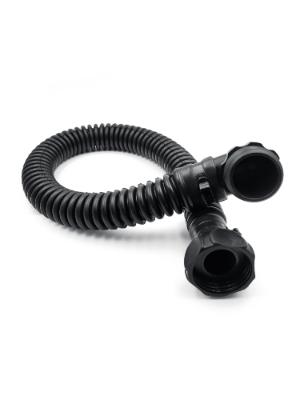The Complete Buyer’s Guide to Choosing a Gas Mask with Hose
As we navigate a world filled with uncertainty, personal protective equipment has largely transitioned from a luxury to a necessity. Whether you are a first responder, military, industrial worker, survivalist, or simply someone planning for emergencies, finding a good gas mask can really protect one's health. Although most gas masks provide a basic sense of protection, a gas mask with hose allows for a better overall sense of comfort, mobility, and safety, especially if you'll be in the mask for many hours or are working in high-hazard environments.
A gas mask with a hose allows you to connect your air supply to an outside air filter canister placed outward from your face; this can offer you less breathing resistance, less fatigue, and even weight distribution for longer wear. It is ideal for working for prolonged periods of time in gas-contaminated air or for working with hazardous irritants or chemicals. It's also handy if you find yourself in a situation of working in a confined and very small space, where a mask filter might obstruct your workflow or activity.

What to Look for In A Gas Mask With Hose?
Hose Length and Flexibility
A quality hose is long enough (typically 40–80 cm) for easy movement but not so long that it becomes cumbersome. Flexibility is essential for comfort and operational effectiveness.
Filter Compatibility
Most professional-grade hoses use a 40mm NATO standard thread: an internationally recognized standard to use with a wide array of filters. Using a NATO-standard thread allows you to source replacements easily and use the hose in many different environments.
Durability and Material Quality
Hoses made from high-grade rubber or reinforced materials that withstand wear, chemical corrosion, and high or low temperatures are desirable.
Airtight Seals
The mask and hose connectors should make an airtight seal; leaking will compromise your safety.
Choosing the Right Filtration System
The Gas Mask with Hose does not filter the air; it only provides a passage for the air to flow from the filter to the mask. Therefore, it is critical to select the right filter canister. The most common air filters are:
-
NBC Filters - Nuclear, Biological, and Chemical threats.
-
Industrial Filters - Intended for dust, smoke, and chemical vapors.
-
Multi-Gas Filters - For environments with multiple hazards.
When purchasing a gas mask with a hose, ensure that the filter you choose supports your specific risk situation.
Comfort and Fit
Even the most sophisticated gas mask will not help you if it is not comfortable or fits poorly.
-
Adjustable straps allow the user to lock the mask on tightly, but comfortably.
-
Ergonomically shaped facepieces help with pressure points.
-
The placement of a lightweight hose structure on the side can help reduce neck fatigue.
Make sure that you test out your mask and hose while moving; bend, crouch, or turn your head to ensure that the hose stays in place and is not causing a pull on your neck.
Safety Standards and Certifications
Safety equipment must meet recognized testing standards. Look for Israeli gas masks for sale and hoses that comply with:
-
EN 136 (Europe)
-
NIOSH (USA)
-
MIL-SPEC (Military Standards)
These certifications ensure your gear has been tested under rigorous conditions for protection, durability, and usability.

Maintenance and Storage
Your gas mask with a hose will only protect you if it’s in good working condition.
-
Regular Inspections – Check hose flexibility, seals, and connector threads.
-
Proper Cleaning – Follow manufacturer guidelines for cleaning after each use.
-
Cool, Dry Storage – Avoid exposure to sunlight and chemicals when storing.
A well-maintained gas mask can last for years, making it a valuable investment.
Common Pitfalls to Avoid When Purchasing
-
Choosing solely based on price - Cheaper models typically do not have the proper seals, or should we say, the proper durability.
-
Ignoring compatibility - Ensure that the hose, mask, and filter all fit together.
-
Buying without checking certification - Masks that aren't certified may be useless when you need one.
When Should You Consider a Gas Mask with a Hose?
You should consider purchasing this type of gas mask if you:
-
Work in firefighting, the military, hazardous industry.
-
Need protection when working on chemicals or in areas that are polluted.
-
Take part in emergency preparedness or survival training.
Bottom Line
A Gas Mask with Hose is a powerful tool for protection, combining flexibility, comfort, and efficiency. By considering hose length, material durability, filter compatibility, comfort, and safety certifications, you can choose a model that will protect you effectively in hazardous environments. Proper maintenance ensures your mask will be ready whenever you need it, making it a critical component of your safety gear.
For those seeking military-grade reliability and 40mm NATO compatibility, the Gas Mask Hose – 40mm NATO Military Hose from Supergum.shop is an excellent choice. Built to withstand demanding conditions, we offer flexibility, durability, and a secure seal—perfect for professionals and preparedness enthusiasts who won’t compromise on safety.


